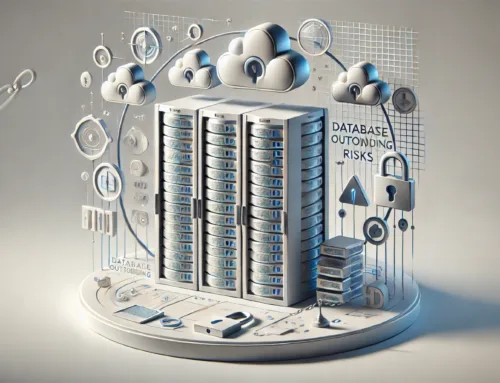Imagine your data as a precious gem, requiring the utmost protection. When entrusting your database to an external provider, how can you ensure its security remains intact? From encryption methods to secure data transfer protocols and stringent access controls, the steps you take are crucial. Let’s explore the key strategies to ensure data security with Database Outsourcing.
Encryption Methods
When considering data security in database outsourcing, encryption methods play a critical role in safeguarding sensitive information. Data encryption involves converting data into a code to prevent unauthorized access. By implementing robust encryption algorithms, such as Advanced Encryption Standard (AES) or Rivest Cipher (RC4), organizations can ensure that even if the data is intercepted, it remains secure and unintelligible to unauthorized parties.
Security audits are essential for verifying the effectiveness of encryption methods. These audits involve thorough assessments of the encryption protocols, key management practices, and overall data security measures in place. By conducting regular security audits, organizations can identify potential vulnerabilities in their encryption processes and address them promptly to enhance the overall security posture.
Secure Data Transfer
When transferring data in the context of database outsourcing, it is crucial to ensure encrypted data transfer. Secure network connections play a vital role in safeguarding the transmission of sensitive information. Implementing data integrity measures further strengthens the security of the data transfer process.
Encrypted Data Transfer
To ensure the secure transfer of data when outsourcing database management, utilizing encryption is a fundamental practice. When sensitive information is transmitted between your systems and the outsourced database provider, encrypting the data ensures that even if intercepted, it remains unintelligible to unauthorized parties. Encryption is a crucial component of data protection during transmission, safeguarding against potential breaches and ensuring secure communication channels.
Implementing encryption protocols such as SSL/TLS (Secure Sockets Layer/Transport Layer Security) or VPNs (Virtual Private Networks) adds layers of security to your data transfer processes. SSL/TLS encrypts data during transit, providing a secure connection between systems, while VPNs create encrypted tunnels for data to travel through. These methods are essential for maintaining the confidentiality and integrity of your data during transfer, reducing the risk of unauthorized access or interception.
Secure Network Connections
For ensuring the secure transfer of data in database outsourcing, establishing secure network connections is imperative. Network monitoring plays a crucial role in maintaining the security of these connections. By continuously monitoring network traffic and activities, any suspicious behavior or unauthorized access attempts can be promptly identified and addressed. This proactive approach enhances the overall security posture of the data transfer process.
In addition to network monitoring, effective password management is vital for securing network connections. Implementing strong password policies, such as requiring complex passwords and regular password changes, helps prevent unauthorized access to the network. Utilizing multi-factor authentication further strengthens the security of network connections by adding an extra layer of verification.
Data Integrity Measures
To ensure the integrity of data during its transfer process, robust data encryption protocols must be implemented. When it comes to data integrity measures in database outsourcing, consider the following:
- Backup procedures: Regularly backing up data ensures that in case of any transfer errors or corruption during the process, you have a safe copy to rely on.
- Data validation: Implement mechanisms to validate data integrity before and after its transfer to ensure its accuracy and completeness.
- Encryption techniques: Utilize strong encryption methods such as AES (Advanced Encryption Standard) to protect data while in transit, reducing the risk of unauthorized access.
- Checksum verification: By using checksums, you can verify the integrity of transferred data by comparing the checksum value before and after the transfer process.
- Secure transfer protocols: Utilize secure protocols like HTTPS or SFTP to ensure data is transferred over encrypted channels, safeguarding it from interception or tampering.
Data Access Control
When managing data security in database outsourcing, one critical aspect that requires meticulous attention is the implementation of robust data access control mechanisms. Role-based permissions play a vital role in ensuring that individuals only have access to the data necessary for their specific job functions. By assigning permissions based on roles such as administrator, analyst, or user, organizations can control who can view, edit, or delete data within the database.
Access monitoring is equally essential in maintaining data security. By implementing monitoring tools, organizations can track user activities, identify any unauthorized access attempts, and monitor changes made to the database. Regularly reviewing access logs and audit trails can help detect any suspicious behavior and prevent potential data breaches.
Security Protocols
How do security protocols contribute to safeguarding sensitive data in the context of database outsourcing? Security protocols play a crucial role in ensuring the protection of your valuable data when outsourcing your database management needs. By implementing robust security measures, you can significantly reduce the risk of unauthorized access and data breaches. Two key components of security protocols that are essential for data protection are data encryption and access control.
- Data Encryption: Encrypting your data ensures that even if unauthorized users gain access to it, they cannot decipher the information without the encryption key.
- Access Control: Setting up access controls allows you to regulate who can view, edit, or delete specific data within the database, minimizing the chances of unauthorized tampering.
- Regular Security Audits: Conducting routine security audits helps identify vulnerabilities and areas that need improvement in your security protocols.
- Multi-Factor Authentication: Implementing multi-factor authentication adds an extra layer of security by requiring additional verification steps beyond the traditional password.
- Secure Communication Channels: Using secure communication channels such as VPNs or encrypted connections when accessing the database remotely enhances data protection during transit.
Third-Party Certifications
Security protocols form a strong foundation for safeguarding sensitive data in database outsourcing scenarios. Third-party certifications play a crucial role in ensuring compliance with stringent regulatory requirements. When selecting a third-party provider for your database outsourcing needs, it is essential to prioritize certifications that demonstrate adherence to industry-specific compliance standards. These certifications serve as tangible proof that the service provider has implemented robust security measures and processes to protect your data effectively.
Look for certifications such as ISO 27001 for information security management systems and SOC 2 for service organizations’ controls. These certifications validate that the service provider meets internationally recognized standards for data security and confidentiality. Furthermore, certifications like HIPAA and GDPR compliance demonstrate a commitment to safeguarding sensitive information in accordance with specific regulatory requirements.
Data Breach Response Plan
Amidst the critical infrastructure of database outsourcing, the establishment of a comprehensive Data Breach Response Plan is paramount. In the event of a breach, having a well-thought-out plan can mitigate potential damage and facilitate a swift recovery process. Here are key components to consider in your Data Breach Response Plan:
- Incident Management: Designate a response team and establish clear protocols for incident reporting and escalation.
- Data Recovery: Implement procedures for isolating affected systems, assessing the extent of the breach, and initiating data recovery efforts.
- Communication Strategy: Define how internal and external stakeholders will be informed about the breach, ensuring transparency and compliance with legal requirements.
- Forensic Analysis: Conduct a thorough investigation to identify the root cause of the breach and prevent future incidents.
- Continuous Improvement: Regularly review and update the response plan based on lessons learned from past breaches to enhance preparedness for future incidents.
Frequently Asked Questions
How Can I Monitor Database Activity for Suspicious Behavior?
To monitor database activity for suspicious behavior, you should implement user permissions monitoring and anomaly detection techniques. These tools help identify unusual actions, unauthorized access, or unusual data patterns, enhancing your ability to detect and respond to potential security threats.
What Measures Are in Place to Prevent Internal Data Breaches?
To prevent internal data breaches, ensure robust employee training on security protocols and implement advanced encryption measures. By fortifying your team’s skills and utilizing cutting-edge encryption, you can bolster your defenses against potential breaches.
Is There a Process for Regular Security Audits and Updates?
Yes, a process for regular security audits and updates is crucial. Monitoring suspicious activity ensures swift detection. Implementing an effective update process strengthens defenses. Always stay vigilant to safeguard your data against evolving threats and vulnerabilities.
How Is Data Integrity Maintained During Outsourcing?
To maintain data integrity during outsourcing, data encryption ensures secure transmission and storage. Access control and strong authentication mechanisms safeguard against unauthorized access. Regular auditing monitors activities to detect any anomalies or breaches promptly, ensuring data remains secure.
Can I Restrict Access to Specific Data Based on User Roles?
To ensure data security, role-based access control is crucial. By assigning specific permissions to user roles, you can restrict access to certain data. Additionally, employing robust data encryption techniques adds an extra layer of protection to safeguard sensitive information.




